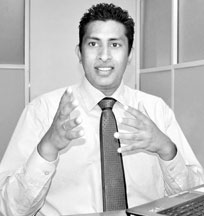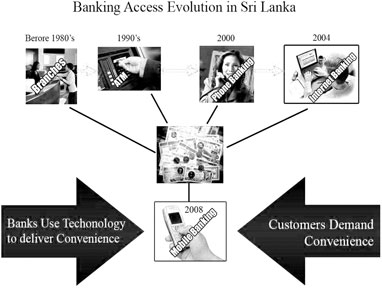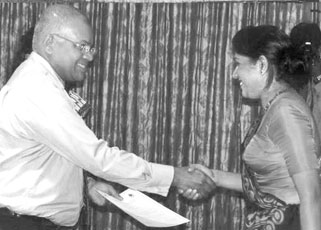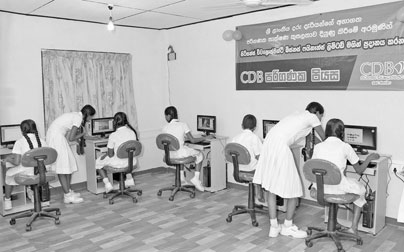Technology
Branches at village boutiques :
Banking via mobile phones
by Gamini WARUSHAMANA
Thilaksha Kodituwakku, a young entrepreneur has developed a banking
solution which can deliver financial services through mobile phones.
 |
|
Thilaksha Kodituwakku |
The solution which can be used by commercial banks has been tested
for security and confidentiality, said Kodituwakku
Responding to a recent article based on an interview with the Head of
Technology and Chief Software Architect of ICTA Sanjaya Karunasena on
service delivery through mobile phones, Kodituwakku said that he has
developed a complete banking solution for commercial banks to support
the delivery of financial services through mobile phones.
Managing director of Ekhash Lanka (Pvt) Ltd., Thilaksha Kodituwakku,
a former bank manager and professional marketeer said that he is trying
to convince the authorities and bankers on the advantages of this system
to the country.
The former Director, Bank Supervision of the Central Bank the late
Dr. Uthum Herath commended the viability of this solution.
Central Bank Governor Ajith Nivard Cabraal has positively responded
to a request and has given me an opportunity to present the solution to
Central Bank officials next week, he said.
The banking solution can be used to deliver banking services to rural
areas using the country’s advantages including the extremely high
telephone penetration and the high literacy of the people.
Today the majority of the population has no direct access to the
formal financial system though they need financial services.
However, most people still save money in tills and this dead money
does not come into the financial system.
Only 30 per cent of the population, especially those who live in
urban and suburban have easy access to bank branches and alternative
channels.
Their financial literacy level is very high.
The 70 per cent population living in rural areas are under banked or
unbanked and have no access to bank branches or alternative channels
while their financial literacy is very low.
Market segment
Most of the private sector companies have recognised the value of
this market segment. For instance, companies selling FMCG soap, shampoo
and food items use “Sachet Marketing” to sell their products to the
rural masses. Telco companies too have focused on this market by
introducing Rs. 20 and 50 reload packages and cards. The banks have
tremendous opportunities to tap this market and banking via telephone is
the ideal way forward.
The new M-banking model will give secure and quick banking service to
millions of people, Kodituwakku said.
Kodituwakku explained the operation of the model. The bank service is
delivered through agents and even small boutiques can act as bank
branches that accept deposits and people can also withdraw money.
This is similar to telco companies selling their services through
reload packages or phone cards.
The agents should have an account with the partner bank and maintain
a pre agreed minimum balance daily.
When a customer needs to deposit money in his account in the bank he
can visit an agent (A boutique in the village) and give money to the
trader and the trader transfers the money from his account to the
customer’s account.
 The transaction will be complete within seconds and the customer and
the trader receive messages on their phones informing them that the
transaction was successful. The transaction will be complete within seconds and the customer and
the trader receive messages on their phones informing them that the
transaction was successful.
The system can be used for deposits, fund transfers, cash
withdrawals, micro finance operations, payment of utility bills, credit
card payments payment for goods and services and many more, he said.
This system is important in many ways. According to traditional
banking system in the country today people have to visit a bank or bank
branch to get the service. To reach a Teller machine too they have to go
to a town or a suburb.
We did some research in Kurunegala, Anuradhapura and the Nuwara Eliya
districts and found that most of the people who are excluded by the
formal banking system live in areas that are far from bank branches.
Most of them wish to save money and use other financial services.
However, the opportunity cost of one bank transaction is their daily
wage/earning from their economic activities in addition to transport and
other costs.
Internet banking
Internet banking is available but access is very limited and only a
few privileged people have broad band access. Several models introduced
previously such as palm top banking, banking at a post office and
doorstep banking have failed due to many limitations in technology or
other practical difficulties. SMS banking is the most insecure banking
system, he said.
Kodituwakku said that there are many advantages in this kind of
banking system. It will enable banks to reach the majority of the
population and attract the money that is circulating outside the banking
system.
It will increase the GDP in the long run as the people need not stop
their usual work to go to a bank.
People can access the formal financial system easily and reduce the
risk of their savings.
The people’s financial literacy will also increase.
The system will help poverty reduction and enhance the lifestyle of
poor people.
On the other hand banks could cut costs. Today the cost of a bank
transaction is around Rs. 50 if all the costs associated in a bank
operation.
For instance in Pakistan setting up a “agent location” is 1/30th of
the costs of setting up a branch and the running cost is cheaper as
1/100th of the running cost of a branch.
Kodituwakku has studied similar banking systems which have been
successfully implemented in many countries. Eko in India, Gcash
introduced by the Rural Bank Association of Philippines, Wizzit of Bank
of Athens, Africa and WING introduced by Standard Charted Bank, Cambodia
and Mcheck in Pakistan are some of the success stories. In India and the
Philippines bank transactions can be done through an agent or a small
village boutique. In India, the customer can even open an account
through an agent.
Ekash solution
To make this kind of banking solution a success there should be the
right approach, correct technology platform and appropriate marketing
strategies.
Customers should be able to access via any phone, the mobile or land
phone of any operator.
It should be a banking solution where the banks are responsible for
all transactions.
A proven security system, compliance to banking regulations and
Central Bank guidelines are essential.
The transaction should be as easy as making a telephone call.
Messages and instructions should be available in any language and the
people’s literacy should not be a barrier.
Kodituwakku assured that the Ekash solution that he has developed has
all these features.
He seeks the support of the Central Bank, Banks and telco operators
to implement the system in Sri Lanka.
JKH scholorships for Moratuwa varsity students
 |
|
JKH Transportation Group President
Romesh David presents a scholarship to an undergraduate of
the Transport and Logistics Management Department at the
awards ceremony of the English Language Scholarship and
Mentoring Programs sponsored by JKH for undergraduates
reading for the Bachelor of Science degree in Transport and
Logistics Management (BSc T&LM Hons.) at the University of
Moratuwa. |
JKH’s Transportation Sector recently awarded 26 university
scholarships as part of its four year partnership with the Transport and
Logistics Management Faculty of the University of Moratuwa. The
scholarship awards coincided with the certificate distribution ceremony
of the English Language Scholarship Program and the Mentoring Program
which are also sponsored by John Keells Group for undergraduates reading
for the Bachelor of Science Degree in Transport and Logistics Management
(BSc. T&LM Hons.) at the University of Moratuwa.
The event was held on June 21, 2010 at the Cinnamon Grand Colombo. A
total of 26 university scholarships were awarded to the students: 21
merit scholarships to second, third and fourth year students, and five
need based scholarships for first year students. The merit based
scholarships reward academic excellence while the need based
scholarships help first year students reach their potential. JKH PLC has
awarded over 54 scholarships since the inception of this degree program
4 years ago.
The English Language Scholarship Program and the Mentoring Program
are aimed at enhancing the general capabilities and soft skills of the
students. Over 200 students were awarded certificates at the ceremony
which marks their first step as professionals in their chosen field.
Certificates of completion of the mentoring program were also awarded
at this event. This program involves the mentoring of students by senior
professionals in the transportation and logistics field.
The English Language Scholarship Program is sponsored by the John
Keells Social Responsibility Foundation. This program is attended by all
first year students and is of benefit to the students since the degree
program is also conducted in English.
Euromoney picks HNB as best Lankan bank
Hatton National Bank (HNB) was recognised as the ‘Best Bank in Sri
Lanka’ by the international Euromoney finance magazine for the second
time at the Euromoney Awards for Excellence 2010 Dinner held last week
in London.
Recognizing HNB as the Best Bank in Sri Lanka, Euromoney stated that
crucial to Sri Lanka’s economic future is a solid banking system, and no
lender has proved itself more capable over the past year than HNB.
Euromoney further stated that the privately run Colombo-based lender,
which recently celebrated its 120th birthday, posted pre-tax earnings of
Rs. 5.9 billion ($52 million) for the year 2009, up 24 per cent year on
year, on income of Rs. 39.4 billion.
Managing Director/CEO, HNB, Rajendra Theagarajah stated “It is truly
an honour to be adjudged the Best Bank in Sri Lanka by the prestigious
Euromoney finance magazine for the second consecutive time.
Our strong commitment towards delivering an unparalleled service to
customers, consistent growth recorded and continuous focus on enhancing
shareholder value are the cornerstones of our achievement”.
Since 1992, Euromoney, the world’s leading financial markets
magazine, has singled out outstanding institutions in finance.
Awards for Excellence have evolved with the markets they cover.
They now incorporate 25 global awards for banking and capital markets
and awards for the best banks and securities houses in almost 100
countries around the world.
The awards have one central theme - to recognise institutions and
individuals that demonstrate leadership, innovation, and momentum in the
markets in which they excel.
At the awards ceremony, Credit Suisse was adjudged the best global
bank and Deutsche Bank, the best global investment bank. CEO, Citigroup,
Vikram Pandit was recognised as Euromoney’s banker of the year.
CDB gifts IT lab to school in Hambantota
 |
|
Students at the
computer lab. |
Citizens Development Business Finance Ltd (CDB) recently donated a
much needed IT lab, fully equipped with computers, LCD monitors,
printers, scanners, and internet facilities to HM/Nedigamvila Kanishta
Vidyalaya in Tissamaharama, in the Hambantota district.
This state-of-the-art IT lab was ceremonially opened by CDB’s Chief
Executive Officer Mahesh Nanayakkara, together with senior officials of
CDB, the School Principal P.N.M Kumarasinghe, students and well-wishers.
Speaking on the occasion Nanayakkara said, the main objective of such
projects is to give less privileged schools in rural areas access to
information technology and thus enable them to launch into a future
shaped by technological innovation.
The CDB Technology Centre paves the way for students such as those at
Nedigamvila Kanishta Vidyalaya to zoom in on future opportunities in the
growing IT sector as well as to acquire a skill which is indispensable
in any area of specialisation.
The project is implemented under the CSR theme of CDB Pariganaka
Piyasa (CDB Technology Centre).
Intec demonstrates low-cost charging and billing performance
A leading provider of Business Support System (BSS) solutions,
announced the completion of another successful performance benchmark of
its award-winning charging, billing and customer care system Singl.eView
v7.0.
The performance results reaffirmed Intec’s commitment to providing
software that offers exceptional performance on platforms that are a
fraction of the cost of traditional UNIX servers.
It also demonstrated that Singl.eView, running on Intel® Xeon®
processor 7500 series, easily supports millions of convergent prepaid
and postpaid subscribers, executing real-world service and business
processes.
The benchmark, carried out by Intec on Intels latest Xeon® processor
7500 series, validated the performance of Singl.eView’s critical
functions:
* Real-time rating and balance management
* Batch post-event rating
* Bill cycle processing
Singl.eView is relied upon by many of the largest and most innovative
communications service providers (CSPs) worldwide. Singl.eViews
efficient, distributed architecture allows CSPs to lower their operating
costs by supporting all rating, balance management, charging and billing
tasks on a single platform, serving postpaid, prepaid and convergent
customers for all classes of product and service.
The Intel Xeon® processor 7500 series ushers in a new era in
performance and scalability within the fast growing x86 server market.
Singl.eView, running on the Intel Xeon platform, provides a powerful
and cost-effective solution for today’s service providers, allowing an
attractive price-performance ratio with more than adequate headroom to
support the growing volume of increasingly complex demands of modern
transaction processing.
EMEA Director of Intel Software and Services Group, Wolfgang Petersen
said the results of this benchmark prove that BSS customers need no
longer be dependent on expensive proprietary servers, and can be
confident that Intel-based affordable processing solutions powered by
the Xeon® 7500 series can easily manage highly-demanding workloads, and
deliver the real-time performance necessary for a modern, converged
communications service provider.
HP introduces energy-efficient laser printer for SMBs
HP launched its environmentally-responsible imaging and printing
products and solutions, including industry-first innovations for small
and midsize businesses (SMBs) to obtain more value from their IT
investments and to reduce energy and paper use, reduce costs and
environmental impact.
Senior Vice-President, Imaging and Printing Group, Hewlett-Packard
Asia Pacific and Japan. John Solomon said, “HP is a leader in
environmental sustainability.
It is in our DNA to deliver solutions that make it easy for customers
to reduce their environmental impact and save money.
This aligns with our goal to remain the partner of choice for SMBs in
Asia Pacific by providing a value equation that encompasses how we can
help SMBs go green for their bottom-line and accelerate their business
growth.
HP introduces the most energy-efficient laser printer in the world(1)
The affordable, HP LaserJet P1102 and P1102w printers help customers
affordabley increase efficiency.
In addition, with HP Smart Install, the HP LaserJet Pro1102w lets SMB
owners quickly connect and print on-the-go or from virtually anywhere in
the home or small office. |

